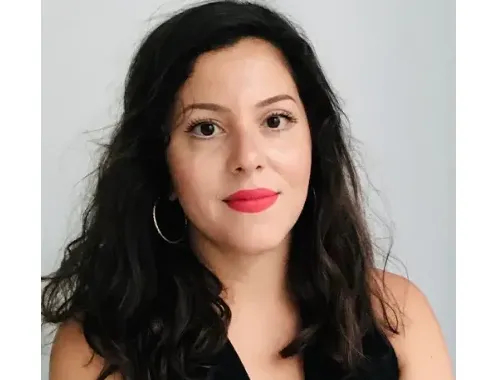Konstantina Barousi - Senior Global Category Manager, Natural Chemicals at Givaudan


Konstantina Barousi is the Senior Global Category Manager, Natural Chemicals at Givaudan in Zurich, Switzerland. She started her Procurement & Supply Chain career at Amcor in 2014 and is a member of the Chartered Institute of Procurement & Supply (CIPS).
What excites you about working for Givaudan?
The industry of flavours and fragrances overall and my portfolio, in particular, are dynamic, impactful and interesting - every day is an opportunity for a new challenge.
The part that I am enjoying the most though, working for Givaudan, is the international and diverse environment of the company. I am leading a team of three women. We are all based in different continents, we speak different native languages, and we come from different academic and work backgrounds. We collaborate closely with our dotted-line colleagues around the world. Just in our extended team of Natural Chemicals, we have more than ten different nationalities, with the majority of us being women.
Your portfolio within naturals is one that contributes to a significant amount of the company’s product revenue and seems to be quite a high innovation area. What would you say are the biggest drivers?
Innovation is a key pillar for my category's strategy, not just a buzzword. In my category, we have exposure to the business of sugar reduction, vegan and organic formulas, sweets and confectionary, beverages, as well as fragrances and cosmetics.
Our team is working cross-functionally to ensure that the scientific and health advantages, following extensive research, come with competitive pricing through partnerships under different schemes of collaboration. Our suppliers are major stakeholders in this work. The natural and pioneering production processes of some of our raw materials are drivers and triggers for innovation. They are key enablers for our sustainability achievements, and they support targets on Scope 3 initiatives, as well.
You have worked in a number of large global matrix organisations. What are the biggest challenges for a leader overseeing a remote team?
The timezone difference, particularly for global meetings, is a challenge. However, this can be overcome and can also deliver value by having quicker turnaround time in external and internal discussions around the clock.
But this requires good time management, a solid communication structure, and adaptability in ways of working. For example, organising a global cross-functional call is not as easy as inviting a colleague for a quick coffee in the office spontaneously to solve an urgent matter.
As an expat yourself, what advice would you offer to someone moving to Switzerland?
Switzerland is an impressive and very well organised country. I would advise any expat on their way here to not be afraid of logistics, as bureaucracy is minimal, and it is quick to find their way through. They should use their network of colleagues and friends, ask questions, and enjoy the ride!
How can a job seeker stand out in the current market?
I always considered flexibility a key strength – now, more than ever. Taking change as a constant, being willing to learn and staying resilient to distractive situations are all expressions of flexibility in real life.
In other words, my advice for a job seeker would be: do not wait for the perfect match, be ready to learn, find the opportunity and make it happen.
Who is the most inspiring person in business for you and why?
I admire pioneers who start a business with a clear purpose, such as Henry Ford. He introduced the assembly line, standardized processes for mass production, and, more importantly, implemented wage increases and the 40-hour week in the early 20th century.
However, the ones that I am more inspired by are the stories of people who were born non-privileged and wanted to change the world, by giving back value to the society through their enterprises. Mary Ellen Pleasant and Madam CJ Walker were the first self-made millionaires of African-American heritage in the USA, dealing with real estate and the cosmetics business, respectively. They opened the way for many visionaries after them.
What is the future of Procurement & Supply Chain?
The future will be technology-enabled and human-led. It comes with digitalisation and technological advancements: artificial intelligence, big data, internet of things (IoT); all the tools that we can use to improve efficiency and agility for Procurement’s ways of working.
We need to embrace the speed of change and ride the wave. These tools can offer opportunities for development to our brains, as well; coding, for instance, not only supports business programs to run through our laptops, but learning how to code can boost our problem-solving skills and our creativity, too.
Naturally, human skills are still important; empathy, emotional intelligence and people management skills, as in all business functions, are key for a team's success, particularly in turbulent times, such as the past few years.
In order to overcome an obstacle, when a dead-end is seen by a tool, the strategic thinking and - even more - the passion of a professional, will open the path. Ethical decision-making and leadership skills will always be at the top of the list for a Procurement professional, and cannot be replaced by a robot. After all, we are all human beings - both us and our suppliers - and we need trust for a partnership to work.
Thank you to Konstantina for speaking to Charlotte Cruise, Senior Consultant in our Procurement & Supply Chain recruitment team in Switzerland.
Views and opinions contained within our Executive Interviews are those of the interviewee and not views shared by EMEA Recruitment.






You can also use your social account to sign in. First you need to:
Accept Terms & Conditions And Privacy Policy